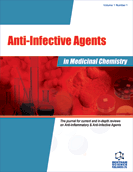Abstract
In the search for effective, selective and nontoxic antiviral agents, a variety of nucleoside analogues have been synthesized, with different functionalities in the carbohydrate moiety. Unsaturated nucleoside analogues are recognized as an important class of biologically active compounds and appear to be prominent drugs in the management of several viral infections, including HSV, HIV, HBV, HCV and HCMV infections. Currently, unsaturated nucleoside mimetics, such as stavudine, abacavir and entecavir have been approved for the treatment of viral infections, while elvucitabine and β-L-2β- F-d4C are in clinical trials. The purpose of this review is to give an update of the recent developments on unsaturated nucleoside and nucleoside analogues, in both cyclic and acyclic forms, which possess promising therapeutic potential, mainly antiviral. It covers analogues with ring sizes from three to six and provides useful data, in the aim to enhance chemical reactivity or to study the fixation of the sugar conformation.
Keywords: Unsaturated nucleosides, carbocyclic, exomethylene, acyclic, antiviral
Anti-Infective Agents in Medicinal Chemistry
Title: Antiviral Unsaturated Nucleosides
Volume: 7 Issue: 4
Author(s): Dimitri Komiotis, Stella Manta, Evangelia Tsoukala and Niki Tzioumaki
Affiliation:
Keywords: Unsaturated nucleosides, carbocyclic, exomethylene, acyclic, antiviral
Abstract: In the search for effective, selective and nontoxic antiviral agents, a variety of nucleoside analogues have been synthesized, with different functionalities in the carbohydrate moiety. Unsaturated nucleoside analogues are recognized as an important class of biologically active compounds and appear to be prominent drugs in the management of several viral infections, including HSV, HIV, HBV, HCV and HCMV infections. Currently, unsaturated nucleoside mimetics, such as stavudine, abacavir and entecavir have been approved for the treatment of viral infections, while elvucitabine and β-L-2β- F-d4C are in clinical trials. The purpose of this review is to give an update of the recent developments on unsaturated nucleoside and nucleoside analogues, in both cyclic and acyclic forms, which possess promising therapeutic potential, mainly antiviral. It covers analogues with ring sizes from three to six and provides useful data, in the aim to enhance chemical reactivity or to study the fixation of the sugar conformation.
Export Options
About this article
Cite this article as:
Komiotis Dimitri, Manta Stella, Tsoukala Evangelia and Tzioumaki Niki, Antiviral Unsaturated Nucleosides, Anti-Infective Agents in Medicinal Chemistry 2008; 7 (4) . https://dx.doi.org/10.2174/187152108785908848
| DOI https://dx.doi.org/10.2174/187152108785908848 |
Print ISSN 1871-5214 |
| Publisher Name Bentham Science Publisher |
Online ISSN 1875-6018 |
 8
8





















